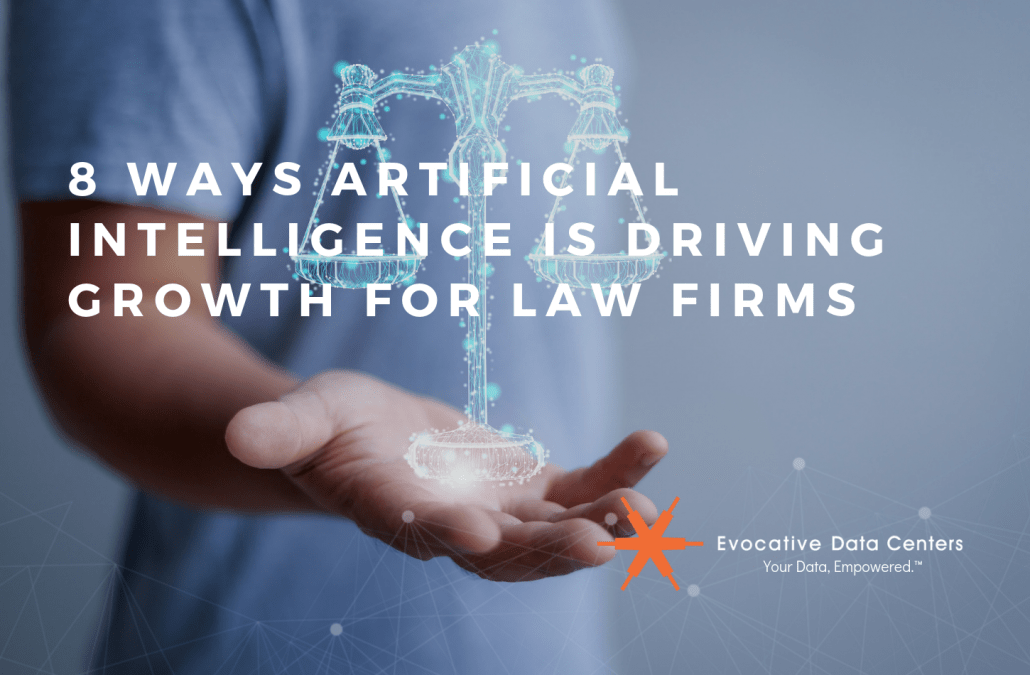Discover 8 ways artificial intelligence is driving growth for law firms.
1. Document Assembly/ Document Automation
To maintain efficiencies and increase the speed with which law firms can draft and provide legal documents to their clients, they are using AI-driven software applications to create complete documents based on client-provided data.
Document automation tools take the information provided directly by clients and insert it in the appropriate sections of legal documents, contracts, Non-Disclosure Agreements, M&A reports, employee handbooks and more. What could have taken days for an attorney or clerk to complete in the past, can now be produced in a few minutes?
2. Legal Analytics
Mining legal records with the use of AI provides the modern law firm with quick access to key insights and data that gives them a competitive edge. Legal arguments from previous cases, a judge’s history and insights on their rulings, as well as legal expertise and cases from other attorneys and litigants, can be analyzed to uncover patterns and determine trends in potential outcomes.
3. Legal Research
Law firms conduct days, weeks and even months’ worth of research for every individual case. Rather than doing tedious Google keyword searches, AI tools enable firms to enhance their keyword searches with cognitive computing to shorten the research period and increase the relevance of the information found.
Cognitive computing includes machine learning, reasoning, natural language processing, speech recognition, object recognition, and other technologies. These AI-based applications can quickly, efficiently, and effectively sort through mountains of electronic records and extensive databases to answer specific legal questions, conduct research, investigate issues and uncover links that might have gone undiscovered with simple keyword searches. This sophisticated legal research can save both the law firm and client a great deal of time and money on their specific case.
4. Predictive Technology
Law firms are continually evaluating ways to decrease litigation risk, improve decision-making processes, better manage individual cases and have a more accurate understanding of the legal outcome. AI-based technology uses predictive modeling to predict the outcomes of cases, their length, specific issues that will arise, and much more.
5. Due Diligence
Attorneys don’t simply take the word of their clients when it comes to preparing a case or legal document. They do their due diligence – performing the legal research, electronic discovery, and in-depth investigation needed to produce the actual data and background information necessary to deliver an informed and fact-based assessment to their clients on what decisions should be made or options which are available to them. Due diligence is often cited during contract negotiations, during the M&A process, in financial transactions, and contracts that require regulatory compliance. Proper due diligence can have positive financial implications for the client whose attorney has used these AI tools most effectively.
6. Contract Review
Lengthy contract reviews can limit how quickly business gets done and can cost clients a large amount of money. They know that hiring a law firm to review their business contracts is necessary but want it to be cost-effective, fast and as painless as possible. AI-based software is making long drawn out contract reviews, including the sorting of documents, summarizing the content and identifying important requirements or conditions a thing of the past by cutting the time to review contracts in half.
7. Intellectual Property
Mountains of intellectual property are created every day and attorneys have historically been required to wade through this data when conducting patent, trademark and copyright searches. Manual searches extend the application process, costing the client time and money. AI tools enable attorneys to complete the search process more quickly and comprehensively.
8. Electronic Billing
Billable hours are the lifeblood of any law firm, so its accuracy is critical to eliminate client questions, ensure ancillary services are not overlooked and time is reported and tracked down to the minute.
AI automates the billing process and reduces cost, the time to process the invoice and increases accuracy.
Conclusion Artificial intelligence is becoming the cornerstone of how the modern, successful law firm conducts business – benefiting both you and your clients. Not only will it enable your firm to improve operational efficiencies, reduce cost and increase competitiveness, but the time and cost savings you realize, as well as the additional insights you gain, will have an immediate and positive impact on your clients as well.
Evocative is a leading provider of secure internet infrastructure solutions, partnering with you to protect the interests of your clients. Law firms, as well as businesses in other regulated industries such as healthcare, financial services, and banking, seek us out because of our commitment to providing a secure and highly available environment in which to store and utilize mission-critical applications, personal client information, legal archives, and colocation equipment.
Our data centers have undergone rigorous scrutiny by independent auditors and have been awarded compliance certifications associated with the management and secure storage of client data. These certifications include SOC 2, SSAE-18, PCI DSS, ISAE 3402, and HIPAA.

